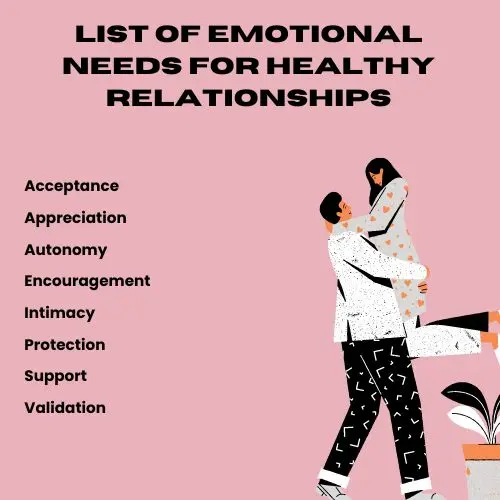Introduction
Every one of us has basic emotional requirements that shape our actions and how we connect with people. Our emotional and relational health depends on our ability to identify these needs and find appropriate ways to meet them.
This article delves into the many emotional requirements people have and how fulfilling those needs can improve our lives. We’ll examine requirements from an individual and a relationship perspective. We may all benefit from a better understanding of emotional needs if we want to improve our communication skills, show greater empathy in our relationships, and foster spaces where others feel understood and cared for.
Let’s begin with an overview table outlining the primary emotional needs discussed:
| Emotional Need | Description |
|---|---|
| Acceptance | Being valued for who you are |
| Affection | Non-sexual expressions of care, love and warmth |
| Appreciation | Feeling recognized and acknowledged for your contributions |
| Autonomy | Having independence and freedom of choice |
| Companionship | Spending quality time with others |
| Encouragement | Receiving support to build self-confidence |
| Intimacy | Deep connection through self-disclosure and vulnerability |
| Protection | Feeling safe and secure both physically and emotionally |
| Respect | Being treated with dignity and having your input taken seriously |
| Support | Receiving help or assistance when needed |
| Trust | Believing others have your best interests at heart |
| Validation | Having your feelings, thoughts and experiences affirmed |
This table provides a high-level overview of common emotional needs. Let’s now delve deeper into each need to unpack why it’s important and how to satisfy it effectively.
Individual Emotional Needs
Acceptance

The urge for acceptance is about wanting to feel loved and cared for completely, no matter what, by other people. Acceptance allows us to be ourselves without worrying about what other people think of us.
Active listening without criticism, praising the other’s attributes, and helping their partner feel respected for who they really are are all ways partners can demonstrate acceptance. By refraining from critical comments and drawing comparisons to others, parents can support their children’s need for acceptance.
Appreciation
Appreciation involves feeling recognized and acknowledged for the contributions, sacrifices and efforts we make. It boosts self-esteem and motivation. Expressing sincere gratitude through compliments, praise and remembering acts of service satisfies this need.
At work, leaders who acknowledge employees regularly see higher morale and performance. In relationships, appreciation strengthens bonds when partners thoughtfully recognize each other. Small gestures like leaving thank you notes can make a big difference.
Autonomy
The need for autonomy is about having independence, freedom of choice and control over our own lives. Too much control from others is psychologically restrictive. Supporting autonomy involves respecting personal boundaries, allowing others space for self-direction, and encouraging independent problem-solving.
Respecting differing opinions as valid and empowering individuals nurtures autonomous emotional well-being. Micromanagement and over-involvement in others’ affairs undermine this important need.
Encouragement

Receiving encouragement boosts self-esteem and confidence. It empowers us to challenge ourselves, take risks and thrive. Expressing belief in others, cheering their efforts, praising progress, and moral support reassures those around us.
At home, parents foster children’s need for encouragement by celebrating effort over outcomes. At work, managers who cheer on teams through challenges see higher commitment. In relationships, partners who build each other up rather than tear down find greater fulfilment.
Intimacy
Intimacy refers to a profound sense of closeness formed through deep self-disclosure, vulnerability and care for another person’s inner world. Sharing private thoughts and feelings, showing affection, and quality bonding time strengthen intimate bonds.
Practising active listening, touching, pet names, and sharing inner hopes are intimate acts. Intimacy requires emotional availability and risk-taking to deeply understand and support one another. It differs from superficial interactions or merely spending time together.
Respecting privacy and avoiding judgments enriches intimacy, which is at the core of mental/relationship wellness. Couples therapists stress the intimacy need’s importance for fulfilment.
Protection

The need for protection involves feeling physically and emotionally safe and secure. It creates an environment where personal growth and risk-taking feel less threatening.
Partners who dependably validate each other’s worth, comfort during hard times or provide a safe refuge from stressors satisfy this need. Parents who are attentively watchful while fostering independence also aid development.
At work, protection comes through fair policies, a respectful culture and safety training. Satisfying the protection need reduces anxiety so people can focus their energies on productivity and relationships.
Support
Support refers to receiving help or assistance when needed, especially during difficult times. Knowing others will be there during challenges and help shoulder life burdens enriches well-being.
Partners can support each other through empathy, encouraging words, lending an ear, assisting with stresses, or problem-solving as teammates. Friends satisfy this need by checking in on each other, celebrating victories together, and offering help practically when life gets busy.
At work, management support shows through reasonable deadlines, guidance, mentorship and flexibility if employees face hardships. Strong support systems reduce stress and nourish resilience.
Validation

Validation is about feeling heard and understood and having your inner experiences, thoughts and feelings confirmed by others in a caring way. It satiates the need to know you’re not alone or abnormal in how you experience the world.
Partners validate each other by acknowledging each other’s perspectives without judgment and seeking to comprehend differing viewpoints. They validate feelings and complex experiences rather than shutting them down.
Parents who listen to children attentively, value feelings equally and say feelings make sense greatly help development. Lack of validation disconnects us psychologically and damages our well-being over time if needs long go unsatisfied.
Relationship Emotional Needs
Affection
The need for affection involves expressing care, warmth and fondness through non-sexual contact. Holding hands, hugs, kisses, or snuggling provides comfort and strengthens relational bonds. For some, words of affection like pet names also nourish well-being.
Partners who make quality affectionate moments part of their daily routines find deeper fulfilment. Parents who shower children with affection, especially when stressed or hurt, satisfy this basic emotional need. Lack of affection is linked to depression, stress and relationship problems over time.
Companionship
Companionship refers to quality time spent together enjoying each other’s company through shared activities, communication, and life’s little pleasures. The need for companionship emerges from our intrinsic social nature.
Couples recharge through activities ranging from cooking together to weekend getaways, which renew vitality for meeting life’s challenges. Friends find purpose in meeting regularly for coffee dates, clubs, or exercise, which creates cherished memories and binding relationships. Quality engagement, not passive togetherness, enriches companionship.
Trust

At the foundation of relationships lies trust—believing others genuinely have your best interests at heart and will reliably be there for you. Trust develops through consistency, integrity, keeping commitments, and discretion over private disclosures.
Partners rebuild trust lost through working as a team, tackling issues, communicating nondefensively, and making amends if trust breaks. Parents’ dependability satisfies children’s deep-seated need to count on caregivers. Strong trusting bonds nourish mental health and resilience across relationships.
Respect
Respect involves treating people with consideration and courtesy, honouring their humanity and dignifying their worth and inherent rights. It involves actively listening without judgment and valuing differing views and priorities equally rather than asserting power or control.
Partners respect each other through compromise, valuing autonomy, speaking kindly despite disagreements and respecting shared living spaces/possessions. At work, respect moves teams towards cohesion through valuing diverse talents, treating all humanely and addressing issues privately. Lack of respect disconnects relationships and undermines well-being.
Strategies for Satisfying Emotional Needs Effectively
While emotional needs emerge naturally, relationship factors greatly impact need satisfaction. Here are strategies for ensuring needs feel properly met:
Quality Time – Prioritize focused engagement by minimizing distractions like phones during conversations. Make eye contact, ask follow-up questions, and regularly find time for meaningful interactions.
Active Listening: Attentively listen without judgment, seek to understand others’ perspectives, and convey your comprehension of their views respectfully, even if they differ.
Expressions of Care – Use verbal and physical signs to convey affection, such as hugs/kisses, gift-giving, thoughtful notes, emotional check-ins, and the ability to share feelings freely.
Compromise—Find balanced solutions that respect all viewpoints rather than collaboratively “winning” or unwillingly forcing views onto others. Work as a team towards mutual understanding.
Honor Commitments – Dependably follow through on plans and promises to build trust over reliability and consideration for others’ needs/schedules.
Voicing Needs Directly—State what you require from others assertively yet respectfully without expectations of mind-reading so needs are properly communicated and clarified.
Accountability—Respectfully take responsibility for your role in issues rather than blaming. Defensiveness allows partnerships to strengthen through challenges via insight.
Healthy Boundaries: Respect others’ right to consent regarding interpersonal matters, limit control over choices, and encourage autonomy developmentally appropriately.
Relaxation Time – Incorporate fun recreation regularly as individuals and couples to relieve stress, bond through shared interests and recharge emotional energies.
Praise Progress—Cheer efforts positively, avoid criticism if possible, and encourage confident improvement over perfectionism, which better nourishes relationships in the long term.
Regular “Check-Ins”—Evaluate periodically how needs are respected, voice concerns constructively, appreciate efforts being made to strengthen communication channels, and normalize expressing vulnerability to foster intimacy.
Conclusion
The keys are open communication of needs coupled with actively listening to understand partners’ perspectives too. By making emotional needs a priority respectfully for all involved, relationships can thrive, and mental wellness can be heightened tremendously.


1 thought on “List Of Emotional Needs for Healthy Relationships”